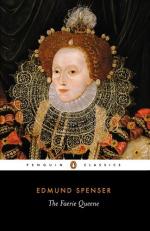2. The false Romish Church becomes drunk in the blood of the martyrs. There is a hint of the persecutions in the Netherlands, in Piedmont, of the massacre of St. Bartholomew’s Day and the burnings under Bloody Mary. Protestant England is delivered from Popish tyranny by the honor and courage of the English people. Militant England (Prince Arthur) is assisted by the clergy (Squire) with his horn (Bible) and is guided by Truth and Common Sense (Dwarf).
23. HORNE OF BUGLE SMALL, the English Bible. Spenser here imitates the description of the magic horn of Logistilla in Ariosto’s Orlando Furioso, xv, 15, 53. Such horns are frequently mentioned in romance, e.g., Chanson de Roland, Morte d’ Arthur, Hawes’ Pastime, Tasso’s Jerusalem Delivered, Huon of Bordeaux, Romance of Sir Otarel, Cervantes’ Don Quixote, etc.
50. LATE CRUELL FEAST, a probable reference to the massacre of St. Bartholomew’s Day in Paris in 1572, and to the persecutions of Alva’s Council of Blood in the Netherlands in 1567.
ix. This stanza is an imitation of Homer’s Iliad, xiv, 414.
95. IN CYMBRIAN PLAINE, probably the Crimea, the ancient Tauric Chersonese. Some connect it with the Cimbric Chersonese, or Jutland, which was famous for its herds of bulls.
96. KINDLY RAGE, natural passion.
105. Note the Latinism “threatened his heads,” and the imperfect rhyme “brands.”
118. HER GOLDEN CUP, suggested by Circe’s magic cup in Homer’s Odyssey, x, 316, and the golden cup of the Babylonish woman in Revelation, xvii, 4.
148. THROUGH GREAT IMPATIENCE OF HIS GRIEVED HED, etc., through inability to endure (the pain of) his wounded head, he would have cast down his rider, etc.
155. IN ONE ALONE LEFT HAND, in one hand alone remaining. His left arm had been cut off (x).
xix. The uncovered shield represents the open Bible. The incident is an imitation of Ruggiero’s display of his shield in Orlando Furioso, xxii, 85.
246. YOUR FORTUNE MAISTER, etc., be master of your fortune by good management.
268. UNUSED RUST, rust which is due to disuse; a Latinism.
296. WITH NATURES PEN, etc., i.e. by his gray hairs, at that age to which proper seriousness belongs. “I cannot tell” did not become his venerable looks.
310. THAT GREATEST PRINCES, etc. This may mean (1) befitting the presence of the greatest princes, or (2) that the greatest princes might deign to behold in person. The first interpretation is preferable.
312. A general reference to the bloody persecutions without regard to age or sex carried on for centuries by the Romish Church, often under the name of “crusades,” “acts of faith,” “holy inquisition,” etc.
315. This may refer to the burning of heretics, under the pretext that the Church shed no blood. Kitchin thinks that it means “accursed ashes.”




